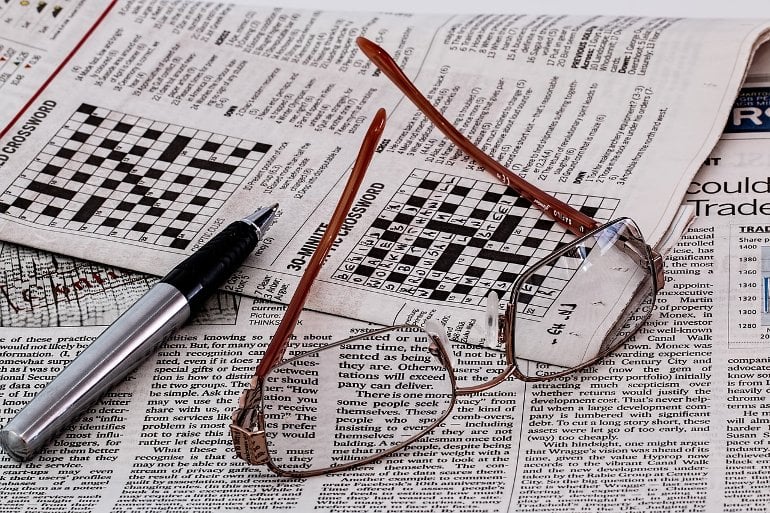Summary: Crossword puzzles have an edge over computerized memory games in improving memory function in older adults with mild cognitive impairment.
Source: Columbia University
A new study by researchers from Columbia University and Duke University published in the journal NEJM Evidence shows that doing crossword puzzles has an advantage over computer video games for memory functioning in older adults with mild cognitive impairment.
In a randomized, controlled trial, led by D.P. Devanand, MD, professor of psychiatry and neurology at Columbia, with Murali Doraiswamy, MD, professor of psychiatry and medicine at Duke, researchers determined that participants (average age 71) trained in doing web-based crossword puzzles demonstrated greater cognitive improvement than those who were trained on cognitive video games.
“This is the first study to document both short-term and longer-term benefits for home-based crossword puzzles training compared to another intervention,” said Dr. Devanand, who oversees brain aging and mental health research at Columbia. “The results are important in light of difficulty in showing improvement with interventions in mild cognitive impairment.”
Crossword puzzles are widely used but have not been studied systematically in mild cognitive impairment, which is associated with high risk for dementia, including Alzheimer’s disease.
To conduct their study, researchers at Columbia and Duke randomly assigned 107 participants with mild cognitive impairment (MCI) at the two different sites to either crossword puzzles training or cognitive games training with intensive training for 12 weeks followed by booster sessions up to 78 weeks. Both interventions were delivered via a computerized platform with weekly compliance monitoring.
The most striking findings of the trial were:
- Crossword puzzles were superior to cognitive games on the primary cognitive outcome measure, ADAS-Cog, at both 12 weeks and 78 weeks. Crossword puzzles were superior on FAQ, a measure of daily functioning, at 78 weeks.
- Crossword puzzles were superior for participants at a later disease stage but both forms of training were equally effective in an earlier stage.
- Brain shrinkage (measured with MRI) was less for crossword puzzles at 78 weeks.
“The benefits were seen not only in cognition but also in daily activities with indications of brain shrinkage on MRI that suggests that the effects are clinically meaningful,” Dr. Devanand said.

The study also highlights the importance of engagement. Based on remote electronic monitoring of computer use, participants at a later stage of impairment may have better engaged with the more familiar crossword puzzles than with computerized cognitive games.
Two strengths of the trial are the 28% participation rate of individuals from racial and ethnic minority groups and the low drop-out rate (15%) for such a lengthy home-based trial. A study limitation was the absence of a control group that did not receive cognitive training.
While these results are highly encouraging, the authors stress the need for replication in a larger controlled trial with an inactive control group.
“The trifecta of improving cognition, function and neuroprotection is the Holy Grail for the field,” said Dr. Doraiswamy. “Further research to scale brain training as a home-based digital therapeutic for delaying Alzheimer’s should be a priority for the field.”
About this memory research news
Author: Press Office
Source: Columbia University
Contact: Press Office – Columbia University
Image: The image is in the public domain
Original Research: Open access.
“Computerized Games Versus Crosswords Training in Mild Cognitive Impairment” by Murali Doraiswamy et al. NEJM Evidence
Abstract
Computerized Games Versus Crosswords Training in Mild Cognitive Impairment
BACKGROUND
Mild cognitive impairment (MCI) increases the risk of dementia. The efficacy of cognitive training in patients with MCI is unclear.
METHODS
In a two-site, single-blinded, 78-week trial, participants with MCI — stratified by age, severity (early/late MCI), and site — were randomly assigned to 12 weeks of intensive, home-based, computerized training with Web-based cognitive games or Web-based crossword puzzles, followed by six booster sessions. In mixed-model analyses, the primary outcome was change from baseline in the 11-item Alzheimer’s Disease Assessment Scale-Cognitive (ADAS-Cog) score, a 70 point scale in which higher scores indicate greater cognitive impairment at 78 weeks, adjusted for baseline. Secondary outcomes included change from baseline in neuropsychological composite score, University of California San Diego Performance-Based Skills Assessment (functional outcome) score, and Functional Activities Questionnaire (functional outcome) score at 78 weeks, adjusted for baseline. Changes in hippocampal volume and cortical thickness on magnetic resonance imaging were assessed.
RESULTS
Among 107 participants (n=51 [games]; n=56 [crosswords]), ADAS-Cog score worsened slightly for games and improved for crosswords at week 78 (least squares [LS] means difference, −1.44; 95% confidence interval [CI], −2.83 to −0.06; P=0.04). From baseline to week 78, mean ADAS-Cog score worsened for games (9.53 to 9.93) and improved for crosswords (9.59 to 8.61). The late MCI subgroup showed similar results (LS means difference, −2.45; SE, 0.89; 95% CI, −4.21 to −0.70). Among secondary outcomes, the Functional Activities Questionnaire score worsened more with games than with crosswords at week 78 (LS means difference, −1.08; 95% CI, −1.97 to −0.18). Other secondary outcomes showed no differences. Decreases in hippocampal volume and cortical thickness were greater for games than for crosswords (LS means difference, 34.07; SE, 17.12; 95% CI, 0.51 to 67.63 [hippocampal volume]; LS means difference, 0.02; SE, 0.01; 95% CI, 0.00 to 0.04 [cortical thickness]).
CONCLUSIONS
Home-based computerized training with crosswords demonstrated superior efficacy to games for the primary outcome of baseline-adjusted change in ADAS-Cog score over 78 weeks. (Supported by the National Institutes of Health, National Institute on Aging; ClinicalTrials.gov number, NCT03205709.)






